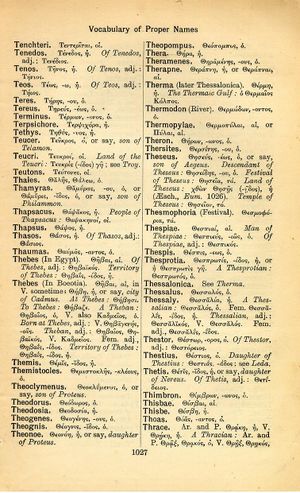Thespiae
καλῶς γέ μου τὸν υἱὸν ὦ Στιλβωνίδη εὑρὼν ἀπιόντ' ἀπὸ γυμνασίου λελουμένον οὐκ ἔκυσας, οὐ προσεῖπας, οὐ προσηγάγου, οὐκ ὠρχιπέδισας, ὢν ἐμοὶ πατρικὸς φίλος → Ah! Is this well done, Stilbonides? You met my son coming from the bath after the gymnasium and you neither spoke to him, nor kissed him, nor took him with you, nor ever once felt his balls. Would anyone call you an old friend of mine?
English > Greek (Woodhouse)
Θεσπιαί, αἱ.
Man of Thespiae: Θεσπιεύς, -ιῶς, ὁ.
Of Thespiae, adj.: Θεσπικός.
Latin > English (Lewis & Short)
Thespĭae: ārum, f., = Θεσπιαί,>
I a town in Bœotia, at the south-eastern foot of Helicon, now the village of Lefka, near Rimokastro, Plin. 4, 7, 12, § 25; 36, 5, 4, § 22; Cic. Verr. 2, 4, 2, § 4; 2, 4, 60, § 135; id. Fam. 13, 22, 1; Liv. 42, 43 al.—Hence,
A The-spĭus, a, um, adj., of or belonging to Thespiæ, Thespian; moenia, Val. Fl. 1, 478.— Plur.: Thespĭi, ōrum, m., the inhabitants of Thespiæ, Arn. 6, p. 196.—
B The-spienses, ĭum, m., the inhabitants of Thespiæ, Cic. Verr. 2,4,60, § 135.—
C Thespĭă-cus, a, um, adj., of or belonging to Thespiæ, Thespian: moenia, Val. Fl. 1, 93: luci, on Mount Helicon, Stat. S. 2, 7, 16.—
D The-spĭădes, ae, m., the Thespian, of Argus, the builder of the ship Argo, Val. Fl. 2, 367; 1, 124.—
E Thespĭăs, ădis, adj. f., Thespian: Musae (as dwelling on Mount Helicon), Ov. M. 5, 310; also called, absol., Thespiades, Varr. L. L. 7, § 20 Müll.; Cic. Verr. 2, 4, 2, § 4; Plin. 36, 5, 4, § 39.

